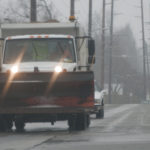Lawrence to purchase GPS system for trash trucks and other city vehicles

A city public works sand truck travels east on 19th Street on Tuesday morning, spreading sand on intersections during a light sleet.
The hands-on work of collecting trash, plowing streets and plugging broken waterlines is about to get a high-tech assist.
Beginning next month, new GPS units will be installed on dozens of trucks and other pieces of equipment owned and operated by the city of Lawrence for basic municipal services: collecting and disposing of solid waste, repairing and clearing public streets, and replacing and unplugging the separate pipes that carry water and sewage.
The intent: Work faster, plan better and, perhaps, spend less doing it.
“We’re using technology to better, more efficiently deploy our resources,” said David Corliss, city manager. “That’s increasingly important when we have limited resources.”
Lawrence city commissioners voted Tuesday to spend $50,199 on the system for 2011. The total includes buying actual GPS units — 35 for trash trucks, 32 for utilities vehicles and 26 for street division trucks and equipment — and a year’s worth of monitoring service through Networkfleet Inc., based in San Diego.
The units will allow supervisors to monitor the precise locations, speeds and, in some cases, even activities of GPS-equipped vehicles and equipment. The street division’s dump trucks, for example, will have special “diagnostic” units that will sense when a snowplow is scraping ice or snow from a road surface, and when a spreader is spraying salt and sand to improve traction.
At some point, the city may make such information available to anyone with Internet access, said Chuck Soules, the city’s director of public works.
“You get up in the morning, see there’s 15 inches of snow, and you’re wondering how you’ll get to work,” Soules said. “You can open this and see which roads we’ve been on and which ones we haven’t been on.”
The units will begin arriving in January, with installation expected to be complete in the spring, he said.
Other benefits of the system, Soules said:
• Efficiency. Supervisors will be able to track trash trucks as they make their daily rounds, to see where routes could be adjusted to save time and fuel — and exactly which truck would be closest to anyone calling in a “missed” collection.
• Accountability. Supervisors hearing reports of a city truck barreling through a residential area will be able to check the claim within moments, simply by looking at a truck’s data on a computer screen.
Businesses with fleets large and small already use such technology to improve efficiency and service, Soules said, and it makes sense to extend such capabilities to appropriate municipal motor pools.
“We’re dealing with public money,” Soules said. “We have to be accountable.”






